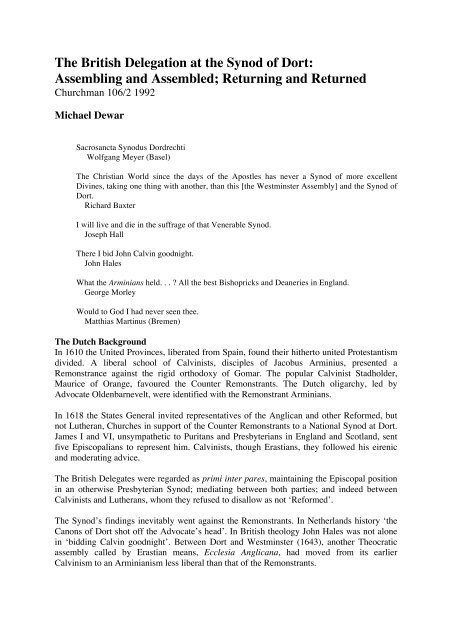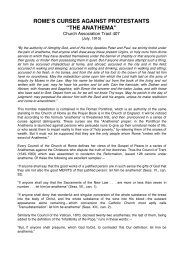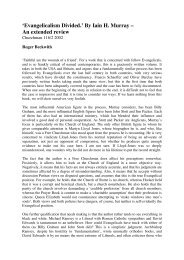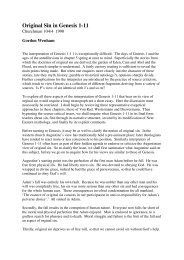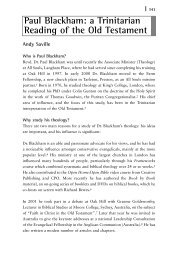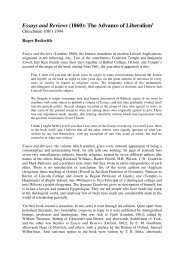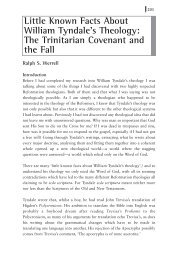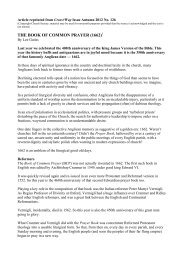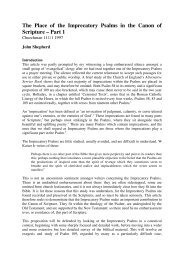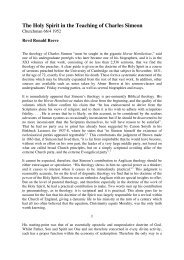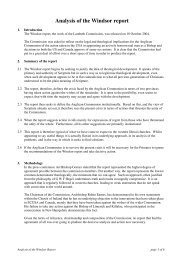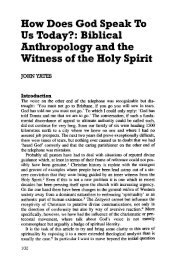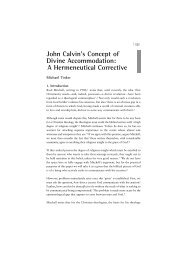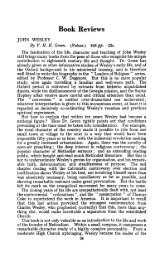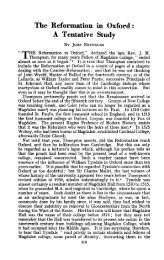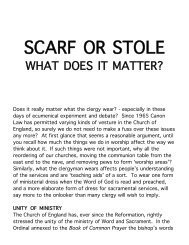The British Delegation at the Synod of Dort ... - Church Society
The British Delegation at the Synod of Dort ... - Church Society
The British Delegation at the Synod of Dort ... - Church Society
Create successful ePaper yourself
Turn your PDF publications into a flip-book with our unique Google optimized e-Paper software.
<strong>The</strong> <strong>British</strong> <strong>Deleg<strong>at</strong>ion</strong> <strong>at</strong> <strong>the</strong> <strong>Synod</strong> <strong>of</strong> <strong>Dort</strong>:<br />
Assembling and Assembled; Returning and Returned<br />
<strong>Church</strong>man 106/2 1992<br />
Michael Dewar<br />
Sacrosancta <strong>Synod</strong>us Dordrechti<br />
Wolfgang Meyer (Basel)<br />
<strong>The</strong> Christian World since <strong>the</strong> days <strong>of</strong> <strong>the</strong> Apostles has never a <strong>Synod</strong> <strong>of</strong> more excellent<br />
Divines, taking one thing with ano<strong>the</strong>r, than this [<strong>the</strong> Westminster Assembly] and <strong>the</strong> <strong>Synod</strong> <strong>of</strong><br />
<strong>Dort</strong>.<br />
Richard Baxter<br />
I will live and die in <strong>the</strong> suffrage <strong>of</strong> th<strong>at</strong> Venerable <strong>Synod</strong>.<br />
Joseph Hall<br />
<strong>The</strong>re I bid John Calvin goodnight.<br />
John Hales<br />
Wh<strong>at</strong> <strong>the</strong> Arminians held. . . ? All <strong>the</strong> best Bishopricks and Deaneries in England.<br />
George Morley<br />
Would to God I had never seen <strong>the</strong>e.<br />
M<strong>at</strong>thias Martinus (Bremen)<br />
<strong>The</strong> Dutch Background<br />
In 1610 <strong>the</strong> United Provinces, liber<strong>at</strong>ed from Spain, found <strong>the</strong>ir hi<strong>the</strong>rto united Protestantism<br />
divided. A liberal school <strong>of</strong> Calvinists, disciples <strong>of</strong> Jacobus Arminius, presented a<br />
Remonstrance against <strong>the</strong> rigid orthodoxy <strong>of</strong> Gomar. <strong>The</strong> popular Calvinist Stadholder,<br />
Maurice <strong>of</strong> Orange, favoured <strong>the</strong> Counter Remonstrants. <strong>The</strong> Dutch oligarchy, led by<br />
Advoc<strong>at</strong>e Oldenbarnevelt, were identified with <strong>the</strong> Remonstrant Arminians.<br />
In 1618 <strong>the</strong> St<strong>at</strong>es General invited represent<strong>at</strong>ives <strong>of</strong> <strong>the</strong> Anglican and o<strong>the</strong>r Reformed, but<br />
not Lu<strong>the</strong>ran, <strong>Church</strong>es in support <strong>of</strong> <strong>the</strong> Counter Remonstrants to a N<strong>at</strong>ional <strong>Synod</strong> <strong>at</strong> <strong>Dort</strong>.<br />
James I and VI, unsymp<strong>at</strong>hetic to Puritans and Presbyterians in England and Scotland, sent<br />
five Episcopalians to represent him. Calvinists, though Erastians, <strong>the</strong>y followed his eirenic<br />
and moder<strong>at</strong>ing advice.<br />
<strong>The</strong> <strong>British</strong> Deleg<strong>at</strong>es were regarded as primi inter pares, maintaining <strong>the</strong> Episcopal position<br />
in an o<strong>the</strong>rwise Presbyterian <strong>Synod</strong>; medi<strong>at</strong>ing between both parties; and indeed between<br />
Calvinists and Lu<strong>the</strong>rans, whom <strong>the</strong>y refused to disallow as not ‘Reformed’.<br />
<strong>The</strong> <strong>Synod</strong>’s findings inevitably went against <strong>the</strong> Remonstrants. In Ne<strong>the</strong>rlands history ‘<strong>the</strong><br />
Canons <strong>of</strong> <strong>Dort</strong> shot <strong>of</strong>f <strong>the</strong> Advoc<strong>at</strong>e’s head’. In <strong>British</strong> <strong>the</strong>ology John Hales was not alone<br />
in ‘bidding Calvin goodnight’. Between <strong>Dort</strong> and Westminster (1643), ano<strong>the</strong>r <strong>The</strong>ocr<strong>at</strong>ic<br />
assembly called by Erastian means, Ecclesia Anglicana, had moved from its earlier<br />
Calvinism to an Arminianism less liberal than th<strong>at</strong> <strong>of</strong> <strong>the</strong> Remonstrants.
1618—King James I: Bohemia and Holland<br />
When <strong>the</strong> Thirty Years’ War began, Protestantism lacked an obvious ‘f<strong>at</strong>her figure’. Th<strong>at</strong><br />
position, once held by William <strong>the</strong> Silent, and paradoxically by Elizabeth <strong>of</strong> England,<br />
devolved by default on <strong>the</strong>ir successors until <strong>the</strong> rise <strong>of</strong> Gustavus Adolphus. But <strong>the</strong><br />
Stadholder Maurice, though now Sovereign Prince <strong>of</strong> Orange, was in <strong>the</strong> United Provinces<br />
only <strong>the</strong> servant <strong>of</strong> <strong>the</strong> St<strong>at</strong>es General. Oldenbarnevelt, <strong>the</strong> Advoc<strong>at</strong>e <strong>of</strong> Holland, was <strong>the</strong>ir<br />
chief executive. <strong>The</strong>se two heirs <strong>of</strong> le Taciturne symbolized <strong>the</strong> dichotomy <strong>of</strong> <strong>the</strong> Dutch<br />
Republic. In Gre<strong>at</strong> Britain James I suffered no such limits to his sovereignty. Heir to<br />
Elizabeth in <strong>Church</strong> and St<strong>at</strong>e, he resisted Presbyterianism in Scotland, and Puritanism in<br />
England, as inimical to Monarchy. But a reaction from <strong>the</strong> Calvinian discipline <strong>of</strong> his youth<br />
had not entirely elimin<strong>at</strong>ed his symp<strong>at</strong>hy for Calvinistic doctrine. 1 His contribution to <strong>the</strong><br />
tragedy <strong>of</strong> 1618 was to support Maurice <strong>of</strong> Orange <strong>the</strong>ologically <strong>at</strong> <strong>Dort</strong>, r<strong>at</strong>her than his own<br />
son-in-law, <strong>the</strong> Elector Pal<strong>at</strong>ine, militarily in Bohemia. In England, <strong>the</strong>y were respectively<br />
known as ‘Grave’ [Graaf] Maurice, and ‘<strong>the</strong> Palgrave’ (Pfalzgraf).<br />
‘<strong>The</strong> Dilettante <strong>The</strong>ologian’<br />
No Tudor monarchs took <strong>the</strong>ir titles <strong>of</strong> Defender <strong>of</strong> <strong>the</strong> Faith and Supreme Earthly Governor<br />
<strong>of</strong> <strong>the</strong> <strong>Church</strong> <strong>of</strong> England more seriously than King James. 2 In Scotland and France<br />
Calvinism tended towards rebellion. In <strong>the</strong> Ne<strong>the</strong>rlands it had played a major part in <strong>the</strong><br />
Spanish War, in which Oldenbarnevelt had secured a twelve years’ truce. Thus Dutch<br />
Calvinism enjoyed an almost unique quasi-Establishment position.<br />
William <strong>the</strong> Silent’s own brand had been moder<strong>at</strong>e. His Coligny widow, Louise de Teligny,<br />
and her son, Frederick Henry, were known supporters <strong>of</strong> <strong>the</strong> Arminian Uytenbogaert, who<br />
had previously been Maurice’s chaplain. <strong>The</strong> Arminians had <strong>the</strong> support <strong>of</strong> <strong>the</strong> Advoc<strong>at</strong>e, and<br />
<strong>the</strong>ir ‘High Mightinesses’, <strong>the</strong> St<strong>at</strong>es General. Maurice was a soldier, not a <strong>the</strong>ologian. It was<br />
said th<strong>at</strong> he did not know if Predestin<strong>at</strong>ion were ‘blue or green’, but he did know th<strong>at</strong> in<br />
Dutch ‘Spain’ (Spanje) and ‘Orange’ (Oranje) rhymed. 3 This gave him standing with <strong>the</strong><br />
militantly p<strong>at</strong>riotic mob against Oldenbarnevelt and <strong>the</strong> oligarchy. Wh<strong>at</strong> began as a dispute<br />
between <strong>the</strong> Leyden Pr<strong>of</strong>essors, Hermensen [Arminius] and Gomar, ended in <strong>the</strong> division <strong>of</strong><br />
Dutch Calvinism and a near schism between <strong>Church</strong> and St<strong>at</strong>e. <strong>The</strong> <strong>Synod</strong> <strong>of</strong> <strong>Dort</strong> was <strong>the</strong><br />
closest to <strong>the</strong> Council <strong>of</strong> Trent th<strong>at</strong> Protestantism was to know.<br />
Uytenbogaert, a disciple <strong>of</strong> Arminius, had drawn up a Remonstrance against <strong>the</strong> strictly<br />
scholastic Calvinism <strong>of</strong> Gomar (1610). It seemed to him to exceed <strong>the</strong> Belgic Confession and<br />
Heidelberg C<strong>at</strong>echism, as well as Scripture itself, in its rigidity. Its chief issues were <strong>the</strong> five<br />
‘Knotty Points’, which had divided Pelagius from Augustine and would divide <strong>the</strong> Jesuits<br />
from Jansen, and Wesley from Whitefield. It had been presented to <strong>the</strong> St<strong>at</strong>es General<br />
through <strong>the</strong> Advoc<strong>at</strong>e who, with Hugo Grotius, was known to be Remonstrant in symp<strong>at</strong>hy.<br />
But <strong>the</strong> majority <strong>of</strong> <strong>the</strong> Dutch Reformed clergy, except in Utrecht, were Counter<br />
Remonstrant. This alignment between <strong>the</strong> quasi royalism <strong>of</strong> <strong>the</strong> House <strong>of</strong> Orange and strict<br />
Calvinism, and ‘Republicanism’ and Arminianism, was quite <strong>the</strong> opposite <strong>of</strong> <strong>the</strong> English and<br />
Scottish situ<strong>at</strong>ion. It seriously alarmed <strong>the</strong> King, who saw <strong>the</strong> similarity between himself and<br />
<strong>the</strong> egalitarian Puritans and <strong>the</strong> Stadholder and <strong>the</strong> ‘Erastian’ Arminians. 4 His ‘No Bishop!<br />
No King!’ foreshadowed <strong>the</strong> l<strong>at</strong>er Dutch ‘Oranje Boven’ (‘Up Orange’). But his orthodoxy<br />
had been equally outraged by <strong>the</strong> appointment <strong>of</strong> ano<strong>the</strong>r heterodox Pr<strong>of</strong>essor to a Leyden<br />
chair (1611). This was Conrad Vorstius, whose heretical books were burned <strong>at</strong> Oxford,<br />
Cambridge, and St. Paul’s Cross. He left <strong>the</strong> St<strong>at</strong>es, through his Ambassador Winwood, in no<br />
doubt th<strong>at</strong> <strong>the</strong> heretic should have followed his heresies to <strong>the</strong> flames.
Seven years l<strong>at</strong>er a Dutch N<strong>at</strong>ional <strong>Synod</strong> was called <strong>at</strong> <strong>Dort</strong> (Dordrecht) in <strong>the</strong> Province <strong>of</strong><br />
Holland. <strong>The</strong> new <strong>British</strong> Ambassador, Sir Dudley Carleton, had been sedulously ‘stoking <strong>the</strong><br />
fires’ against <strong>the</strong> Remonstrants. 5 <strong>The</strong> Stadholder had no authority to call <strong>the</strong> <strong>Synod</strong>, for which<br />
his supporters were pressing. Th<strong>at</strong> was <strong>the</strong> privilege <strong>of</strong> <strong>the</strong> St<strong>at</strong>es General, who were not as<br />
enthusiastic as <strong>the</strong> Counter Remonstrant clergy. But in June 1618 invit<strong>at</strong>ions were sent to all<br />
<strong>the</strong> Dutch Provincial <strong>Synod</strong>s, as well as <strong>the</strong> o<strong>the</strong>r foreign Reformed <strong>Church</strong>es. <strong>The</strong>se<br />
included France, Geneva, <strong>the</strong> Swiss Cantons, several West German st<strong>at</strong>es, Brandenburg and<br />
England. <strong>The</strong>y were essentially Calvinist and ‘conformist’ <strong>Church</strong>es. <strong>The</strong> Augsburg principle<br />
<strong>of</strong> cujus regio ejus religio was n<strong>at</strong>urally as acceptable to Dutch Calvinists, as to all German<br />
Lu<strong>the</strong>rans and Roman C<strong>at</strong>holics, although this was not confirmed until <strong>the</strong> Peace <strong>of</strong><br />
Westphalia thirty years l<strong>at</strong>er. Louis XIII refused to allow <strong>the</strong> Huguenot nominees to leave<br />
France. 6 <strong>The</strong> Calvinist Elector <strong>of</strong> Lu<strong>the</strong>ran Brandenburg diplom<strong>at</strong>ically did <strong>the</strong> same. 7 In<br />
England <strong>the</strong> Dutch Congreg<strong>at</strong>ions, previously represented <strong>at</strong> <strong>the</strong> <strong>Synod</strong>s <strong>of</strong> <strong>the</strong>ir N<strong>at</strong>ional<br />
<strong>Church</strong>, were prevented from sending deleg<strong>at</strong>es by King James’ influence. 8 He had a horror<br />
<strong>of</strong> Dissent, both <strong>at</strong> home and abroad, no less than th<strong>at</strong> <strong>of</strong> Archbishop Laud in <strong>the</strong> next reign.<br />
<strong>The</strong> English <strong>Deleg<strong>at</strong>ion</strong><br />
<strong>The</strong> English <strong>Deleg<strong>at</strong>ion</strong> was itself appointed by him and not by <strong>the</strong> <strong>Church</strong>. This Erastianism<br />
was characteristic <strong>of</strong> <strong>the</strong> English, but not <strong>of</strong> <strong>the</strong> Scottish, <strong>Church</strong>. <strong>The</strong> first four English<br />
deleg<strong>at</strong>es included a Bishop and two future Bishops. <strong>The</strong>y were Dr. George Carleton (not<br />
rel<strong>at</strong>ed to <strong>the</strong> <strong>British</strong> Ambassador), Bishop <strong>of</strong> Llandaff; Dr. Joseph Hall, Dean <strong>of</strong> Worcester;<br />
Dr. John Davenant, Master <strong>of</strong> Queens’ College, Cambridge, and Lady Margaret Pr<strong>of</strong>essor <strong>of</strong><br />
Divinity; and Dr. Samuel Ward, Master <strong>of</strong> Sidney Sussex College, Cambridge, and<br />
Archdeacon <strong>of</strong> Taunton. Jacobean clergy have sometimes been dismissed as time servers, but<br />
<strong>the</strong>se men bridged <strong>the</strong> gap between <strong>the</strong> Elizabethans and <strong>the</strong> Laudians with consistency and<br />
dignity. 9 Writing <strong>of</strong> Archdeacon Ward over a gener<strong>at</strong>ion l<strong>at</strong>er. Thomas Fuller’s tribute could<br />
have included <strong>the</strong>m all:<br />
he turned with <strong>the</strong> times as a rock with <strong>the</strong> tide; and for his uncomplying <strong>the</strong>rewith was<br />
imprisoned in St John’s College in Cambridge. In a word he was counted a Puritan before <strong>the</strong>se<br />
times, and Popish in <strong>the</strong>se times, and yet being always <strong>the</strong> same was a true Protestant <strong>at</strong> all<br />
times. 10<br />
As Elizabethans <strong>the</strong>y were Calvinists to a man. But <strong>the</strong>y were ‘Protestants’, not ‘Puritans’,<br />
not cavilling <strong>at</strong> ceremonies or ‘scrupuling’ <strong>at</strong> surplices. John Whitgift, Elizabeth’s favourite<br />
Archbishop, had set his seal on <strong>the</strong> Lambeth Articles (1595), which were a High Calvinist<br />
extension <strong>of</strong> <strong>the</strong> Thirty-nine Articles. James Ussher, Archbishop <strong>of</strong> Armagh, wrote <strong>the</strong> Irish<br />
Articles (1615), which passed almost verb<strong>at</strong>im into <strong>the</strong> Westminster Confession <strong>of</strong> Faith<br />
(1647). 11<br />
<strong>The</strong> deleg<strong>at</strong>ion received <strong>the</strong>ir royal mand<strong>at</strong>e <strong>at</strong> Newmarket in October 1618. <strong>The</strong>y were urged<br />
to inure <strong>the</strong>mselves fully into <strong>the</strong> L<strong>at</strong>in tongue, to show unity among <strong>the</strong>mselves, to keep to<br />
Scripture and Anglican doctrine, to avoid controversial <strong>the</strong>ology in <strong>the</strong> pulpit, to encourage<br />
<strong>the</strong> Dutch divines to do <strong>the</strong> same. To act as medi<strong>at</strong>ors between <strong>the</strong> disputants as well as<br />
between <strong>the</strong> Continental Confessions, [Lu<strong>the</strong>ran and Calvinist] to keep in touch with him<br />
through his Ambassador, and to use moder<strong>at</strong>ion in everything. <strong>The</strong>re is no doubt th<strong>at</strong> <strong>the</strong><br />
<strong>Deleg<strong>at</strong>ion</strong> was faithful to <strong>the</strong> King’s instructions in every detail. <strong>The</strong> two Cambridge dons,<br />
Davenant and Ward, were granted a fur<strong>the</strong>r royal audience for two hours <strong>at</strong> Royston. <strong>The</strong>y<br />
took <strong>the</strong>ir several ways to <strong>the</strong> coast, casually managing to miss <strong>the</strong> Dutch bo<strong>at</strong> sent to fetch
<strong>the</strong>m over. Taking a l<strong>at</strong>er bo<strong>at</strong> to Middelburg, <strong>the</strong>y reached <strong>the</strong> Hague on October 27 in time<br />
for <strong>the</strong> Stadholder’s reception. 12<br />
<strong>The</strong> <strong>Synod</strong> Assembling<br />
On November 3 <strong>the</strong> <strong>Synod</strong> <strong>of</strong> <strong>Dort</strong> began. Like <strong>the</strong> Westminster Assembly, with which it has<br />
been compared by Richard Baxter, it was a <strong>the</strong>ocr<strong>at</strong>ic assembly convened by Erastian<br />
means. 13 <strong>The</strong> next six months were a testing time for <strong>the</strong> varying loyalties <strong>of</strong> <strong>the</strong> Anglicans as<br />
Christians, Calvinists, and Episcopalians. This essay is not concerned with <strong>the</strong> intricacies <strong>of</strong><br />
<strong>the</strong>ology, or <strong>of</strong> church government, but with <strong>the</strong> interplay <strong>of</strong> <strong>the</strong> Britons against <strong>the</strong><br />
intern<strong>at</strong>ional background <strong>of</strong> this semi-Ecumenical <strong>Synod</strong>. Two o<strong>the</strong>r Englishmen played<br />
considerable parts <strong>at</strong> <strong>Dort</strong>, though not members <strong>of</strong> <strong>the</strong> <strong>British</strong> <strong>Deleg<strong>at</strong>ion</strong>. <strong>The</strong>ir position was<br />
not analogous to th<strong>at</strong> <strong>of</strong> <strong>the</strong> Scottish Commissioners <strong>at</strong> Westminster, who so gre<strong>at</strong>ly<br />
influenced <strong>the</strong> Assembly. <strong>The</strong> Scots were ‘Assessors’ only, with no voting powers. But<br />
William Ames and John Hales were not members <strong>of</strong> <strong>the</strong> <strong>Synod</strong> <strong>at</strong> all. <strong>The</strong> ‘ever memorable’<br />
John Hales <strong>of</strong> Eton was chaplain to <strong>the</strong> <strong>British</strong> Ambassador. His Letters from <strong>Dort</strong>, written to<br />
Sir Dudley Carleton, give as clear a picture <strong>of</strong> <strong>the</strong> background <strong>of</strong> <strong>the</strong> <strong>Synod</strong> as Robert<br />
Baillie’s gossipy Letters and Journals <strong>of</strong> <strong>the</strong> Westminster Assembly. Hales’s n<strong>at</strong>ural<br />
tolerance, and r<strong>at</strong>ional approach, modified his own Calvinism and also, perceptibly, <strong>the</strong><br />
Counter Remonstrant symp<strong>at</strong>hies <strong>of</strong> his master. 14 On <strong>the</strong> o<strong>the</strong>r hand ‘Amesius’ was one <strong>of</strong><br />
those English Puritans who had found his spiritual home with ‘Dutch Divinity’. His position<br />
<strong>at</strong> <strong>Dort</strong> was anomalous. As <strong>the</strong> only English Puritan present he was ‘employed’ by <strong>the</strong><br />
Counter Remonstrants to keep a w<strong>at</strong>ching brief over <strong>the</strong> deliber<strong>at</strong>ions. As an exiled English<br />
Calvinist <strong>of</strong> Dutch Gomarist symp<strong>at</strong>hies, he was persona non gr<strong>at</strong>a with <strong>the</strong> English court,<br />
even with <strong>the</strong> Calvinist Archbishop Abbot. Yet he continued Hales’s work <strong>of</strong> reporting to <strong>the</strong><br />
Ambassador when Hales, like Hall, had gone home. On one occasion he displeased Bishop<br />
Carleton by handing him some <strong>of</strong> his anti-Episcopal writings in a book <strong>of</strong> Grevinchovius, a<br />
Dutch co-religionist. 15 O<strong>the</strong>rwise he seems to have maintained <strong>the</strong> English tradition <strong>of</strong><br />
impartiality.<br />
<strong>The</strong> <strong>Synod</strong> was divided into Interi (Dutch and Walloons) and Exteri (Foreigners). <strong>The</strong> former<br />
consisted <strong>of</strong> thirty-seven ministers, nineteen lay elders and eighteen represent<strong>at</strong>ives <strong>of</strong> <strong>the</strong><br />
St<strong>at</strong>es. <strong>The</strong>re were also five Divinity Pr<strong>of</strong>essors, including Episcopius, <strong>the</strong> chief spokesman<br />
<strong>of</strong> <strong>the</strong> Remonstrants. <strong>The</strong> Exteri numbered twenty-six. A painting by P. Weyts shows <strong>the</strong>m in<br />
session, exactly representing a crude engraving in <strong>the</strong> <strong>of</strong>ficial Acta <strong>Synod</strong>i Dordrechti (1620),<br />
and also <strong>the</strong> <strong>Dort</strong> Medal. <strong>The</strong> members can be identified by <strong>the</strong>ir names and ‘Colleges’. <strong>The</strong><br />
meeting place was a secular, not a sacred building, but fitted with box-like pews for <strong>the</strong><br />
deleg<strong>at</strong>es. <strong>The</strong> Praeses (Moder<strong>at</strong>or) was John Bogermann, a Frisian from Leeuwarden,<br />
supported as ‘scribes’ by Festus Hommius and Daniel Heinsius; both from Leyden, <strong>the</strong> storm<br />
centre <strong>of</strong> <strong>the</strong> controversy. <strong>The</strong>y s<strong>at</strong>, with <strong>the</strong>ir ‘assessors’, <strong>at</strong> <strong>the</strong> top <strong>of</strong> <strong>the</strong> hall; a long table<br />
for <strong>the</strong> Remonstrants ran down its length below <strong>the</strong>m. <strong>The</strong> represent<strong>at</strong>ives <strong>of</strong> <strong>the</strong> St<strong>at</strong>es<br />
General were on <strong>the</strong>ir right, and <strong>the</strong> o<strong>the</strong>r Ne<strong>the</strong>rlanders beyond <strong>the</strong>m. <strong>The</strong> Exteri were on<br />
<strong>the</strong>ir left, from <strong>the</strong> <strong>British</strong> down to <strong>the</strong> Emdeners. Next to <strong>the</strong> favoured Anglicans were <strong>the</strong><br />
empty se<strong>at</strong>s for <strong>the</strong> French, which only served to emphasize <strong>the</strong> absence <strong>of</strong> <strong>the</strong> eirenic Pierre<br />
du Moulin <strong>of</strong> Charenton, and <strong>the</strong> ‘Huguenot Pope’, du Plessis Mornay. Beyond <strong>the</strong>m s<strong>at</strong> <strong>the</strong><br />
Pal<strong>at</strong>ines. Below <strong>the</strong> bar <strong>of</strong> <strong>the</strong> house <strong>the</strong> general public, some four or five hundred <strong>of</strong> ei<strong>the</strong>r<br />
sex were admitted. <strong>The</strong> Dutch shared with John Selden a passion for polemics, ‘coming as<br />
<strong>the</strong> Persians came to see wild asses fight’. 16<br />
After <strong>the</strong> <strong>Synod</strong> had assembled and elected its <strong>of</strong>ficers, <strong>the</strong> first <strong>of</strong>ficial business was <strong>the</strong><br />
taking <strong>of</strong> <strong>the</strong> O<strong>at</strong>h. In view <strong>of</strong> <strong>the</strong> harsh tre<strong>at</strong>ment accorded to <strong>the</strong> Remonstrants, it was
afterwards suggested th<strong>at</strong> an O<strong>at</strong>h was taken to condemn <strong>the</strong>m unheard and out <strong>of</strong> hand.<br />
Although this seems to have been <strong>the</strong> policy <strong>of</strong> <strong>the</strong> Counter Remonstrant majority, it was not<br />
so st<strong>at</strong>ed in <strong>the</strong> O<strong>at</strong>h. It was indignantly denied as l<strong>at</strong>e as 1651 by Joseph Hall, who was<br />
always <strong>at</strong> gre<strong>at</strong> pains to defend <strong>the</strong> integrity <strong>of</strong> <strong>the</strong> <strong>Synod</strong>. 17 Although <strong>the</strong> Remonstrants were<br />
‘predestined’ to defe<strong>at</strong>, and <strong>the</strong>n <strong>the</strong>ir Articles soundly condemned, <strong>the</strong> <strong>British</strong>, <strong>the</strong><br />
Bremeners and <strong>the</strong> Hessians tried to ensure th<strong>at</strong> <strong>the</strong>y received a fair hearing. But <strong>the</strong>se<br />
‘Colleges’ were a minority among <strong>the</strong> Exteri, <strong>the</strong> most rigidly Gomarist being <strong>the</strong> Pal<strong>at</strong>ines<br />
and <strong>the</strong> Genevans. Years l<strong>at</strong>er <strong>the</strong> Independent John Goodwin was controverted by Bishop<br />
Hall on this very issue <strong>of</strong> discrimin<strong>at</strong>ion against <strong>the</strong> Remonstrants, although he had not stayed<br />
to hear <strong>the</strong> most virulent <strong>at</strong>tacks against <strong>the</strong>m. 18<br />
<strong>The</strong> Comments <strong>of</strong> John Hales<br />
Before Episcopius and his party arrived, <strong>the</strong> <strong>Synod</strong> dealt with <strong>the</strong> more positive part <strong>of</strong> its<br />
agenda. This included <strong>the</strong> setting up <strong>of</strong> a Committee on <strong>the</strong> lines <strong>of</strong> <strong>the</strong> Hampton Court<br />
Conference, for <strong>the</strong> transl<strong>at</strong>ion <strong>of</strong> <strong>the</strong> Bible into Dutch. O<strong>the</strong>r preliminary discussions ranged<br />
from <strong>the</strong> propriety <strong>of</strong> illustr<strong>at</strong>ed and annot<strong>at</strong>ed Bibles to <strong>the</strong> baptism <strong>of</strong> <strong>the</strong> children <strong>of</strong> slaves<br />
(‘Ethnicks’) in <strong>the</strong> East Indies. But <strong>the</strong> entry <strong>of</strong> <strong>the</strong> Remonstrants was <strong>the</strong> pièce de résistance<br />
for which <strong>the</strong> Counter Remonstrants eagerly waited. Hi<strong>the</strong>rto <strong>the</strong>ir only symp<strong>at</strong>hizers had<br />
been a small group from Utrecht, who had <strong>the</strong> dangerous privilege <strong>of</strong> introducing <strong>the</strong>m when<br />
<strong>the</strong>y arrived on December 6, <strong>at</strong> <strong>the</strong> twenty-second session. It has not been lost on a modern<br />
Scottish historian th<strong>at</strong> Episcopius’s name is simply <strong>the</strong> L<strong>at</strong>iniz<strong>at</strong>ion <strong>of</strong> ‘Bishop’, which did<br />
not predispose l<strong>at</strong>er Scottish <strong>the</strong>ologians to favour his views! l9 His opening speech was very<br />
eloquent and made a good impression on <strong>the</strong> English. It must be remembered th<strong>at</strong> both<br />
parties were Calvinists, <strong>the</strong> Gomarists being stricter than <strong>the</strong> Arminians, who reserved <strong>the</strong><br />
Protestant right <strong>of</strong> priv<strong>at</strong>e judgment and <strong>of</strong> protest. 20 <strong>The</strong>ir appeal to reason struck John Hales<br />
very forcibly. A member <strong>of</strong> Lord Falkland’s Gre<strong>at</strong> Tew circle, like William Chillingworth,<br />
whose Religion <strong>of</strong> Protestants so antagonized <strong>the</strong> Westminster Divines, he was a man <strong>of</strong><br />
l<strong>at</strong>itude. His friend Anthony Farindon records th<strong>at</strong> <strong>at</strong> <strong>Dort</strong> he ‘bid John Calvin good night’. 21<br />
It may be doubted whe<strong>the</strong>r John Hales had ever really bid Calvin ‘good morning’. His<br />
Calvinism was probably no more than <strong>the</strong> contemporary Englishman’s admir<strong>at</strong>ion for <strong>the</strong><br />
fighting creed <strong>of</strong> <strong>the</strong> Continental Protestant <strong>at</strong> a distance. His change <strong>of</strong> heart is <strong>at</strong>tributed to<br />
<strong>the</strong> ‘well pressing’ <strong>of</strong> St. John III, verse 16, by Episcopius. This was <strong>the</strong> favourite Arminian<br />
‘pro<strong>of</strong> text’, with its promise <strong>of</strong> Universal Salv<strong>at</strong>ion. But it seems more probable th<strong>at</strong> this<br />
exposition was by M<strong>at</strong>thias Martinius <strong>of</strong> Bremen, <strong>the</strong> most liberal minded <strong>of</strong> all <strong>the</strong> Exteri,<br />
not excepting <strong>the</strong> Anglicans. 22 Consequently John Hales reported, drily, to Sir Dudley th<strong>at</strong><br />
‘Our <strong>Synod</strong> goes on like a w<strong>at</strong>ch, <strong>the</strong> main wheels on which <strong>the</strong> whole business turns are<br />
least in sight. For all things <strong>of</strong> moment are acted in priv<strong>at</strong>e sessions. Wh<strong>at</strong> is done in public is<br />
only for show and entertainment.’ 23<br />
<strong>The</strong> Remonstrants soon discovered th<strong>at</strong> <strong>the</strong>y had not been invited to a <strong>the</strong>ological conference<br />
but summoned to a heresy trial. Kept under strict surveillance, <strong>the</strong>y registered a protest<br />
against a ‘packed’ house. <strong>The</strong>y pertinently compared it with a Lu<strong>the</strong>ran <strong>Synod</strong> sitting in<br />
judgment on Calvinist doctrine. 24 This shrewd comparison was unanswerable, as <strong>the</strong> analogy<br />
was too close to be acceptable to <strong>the</strong> Counter Remonstrant majority. A letter from <strong>the</strong><br />
Huguenot absentee, du Moulin, was read, urging th<strong>at</strong> a Confession be drawn up to s<strong>at</strong>isfy<br />
both Lu<strong>the</strong>rans and Calvinists. But <strong>the</strong> Moder<strong>at</strong>or only gave ‘fair words’ and marked it ‘to be<br />
considered’. Sir Dudley wrote to <strong>the</strong> Calvinist Archbishop Abbot th<strong>at</strong> this<br />
does ill suit with our business <strong>of</strong> suppressing <strong>the</strong> Arminians, and <strong>the</strong>refore it will not be thought<br />
fit to make mention <strong>the</strong>re<strong>of</strong> in <strong>the</strong> <strong>Synod</strong>. 25
George Abbot was always a shadowy figure <strong>at</strong> Lambeth, ‘caretaking’ during this Calvinist<br />
interlude between <strong>the</strong> strict Bancr<strong>of</strong>t and <strong>the</strong> stricter Laud. He was approached by Bishop<br />
Carleton on behalf <strong>of</strong> <strong>the</strong> English on <strong>the</strong> vexed question <strong>of</strong> ‘Universal’ or ‘Limited’<br />
Redemption, on which <strong>the</strong>y were divided. <strong>The</strong> majority inclined to his own stricter<br />
interpret<strong>at</strong>ion. 26 L<strong>at</strong>er, having <strong>the</strong> misfortune to shoot a Hampshire gamekeeper, he remained<br />
in merely formal <strong>of</strong>fice till his de<strong>at</strong>h. His influence on <strong>the</strong> <strong>Deleg<strong>at</strong>ion</strong> was, however, less<br />
strong than th<strong>at</strong> <strong>of</strong> ei<strong>the</strong>r <strong>the</strong> King or <strong>the</strong> Ambassador, although his chaplain, Dr. Thomas<br />
Goad, was appointed to succeed Dean Hall.<br />
<strong>The</strong> Departure <strong>of</strong> Dean Hall<br />
<strong>The</strong> sudden departure <strong>of</strong> <strong>the</strong> ablest <strong>of</strong> all <strong>the</strong> Anglicans has always had an air <strong>of</strong> mystery<br />
about it. He had readily accepted <strong>the</strong> invit<strong>at</strong>ion to ‘entertain’ <strong>the</strong> waiting <strong>Deleg<strong>at</strong>ion</strong>, with a<br />
sermon, declined by <strong>the</strong> more cautious Bishop Carleton. This ‘polite and p<strong>at</strong>hetical’ sermon<br />
was well received, although it ended with an appeal to do away with <strong>the</strong> ‘ill-omened’ names<br />
<strong>of</strong> Remonstrant and Counter Remonstrant, Calvinist and Arminian, and to ‘lay aside all<br />
prejudice and party feeling th<strong>at</strong> we may be happily united in <strong>the</strong> enjoyment <strong>of</strong> <strong>the</strong> common<br />
truth’. 27 This was entirely in keeping with <strong>the</strong> King’s counsel to ‘mitig<strong>at</strong>e extremism’ and to<br />
‘promote unity’. But within a fortnight Hales wrote th<strong>at</strong> ‘Mr. Dean <strong>of</strong> Worcester is very crazy<br />
and sickly <strong>of</strong> l<strong>at</strong>e and keeps his chamber, nei<strong>the</strong>r h<strong>at</strong>h he been in <strong>the</strong> <strong>Synod</strong> some <strong>of</strong> <strong>the</strong>se last<br />
Sessions’. 28 By <strong>the</strong> New Year he had slipped away to <strong>the</strong> Hague, ‘giving notice to no man’.<br />
Hales ‘wisht him an ill journey, for this discourtesy’, but ‘hoped he had a good one’ [sic]. 29 In<br />
l<strong>at</strong>er years Bishop Hall was accused <strong>of</strong> feigning a diplom<strong>at</strong>ic illness, and evading <strong>the</strong><br />
controversies th<strong>at</strong> would arise, and <strong>of</strong> accepting <strong>the</strong> Arminian conclusions. 30 This was<br />
strongly denied in his correspondence with Davenant, by <strong>the</strong>n also a bishop. 31 It was not<br />
suggested <strong>at</strong> <strong>the</strong> time, when he took a graceful farewell, apparently in absentia, and was<br />
publicly thanked for his services. He was loaded with gifts, including a generous travel<br />
allowance, and <strong>the</strong> <strong>Dort</strong> Medal and chain, now <strong>the</strong> property <strong>of</strong> his old College. 32 In a lively<br />
passage Fuller noted th<strong>at</strong> thirty years l<strong>at</strong>er (‘Wh<strong>at</strong> cannot God and good air do?’) he had<br />
‘gone over <strong>the</strong> graves <strong>of</strong> all his colleagues’. 33 At <strong>Dort</strong>, as in Devon, Joseph Hall had a ready<br />
explan<strong>at</strong>ion for his sudden change <strong>of</strong> plan. In <strong>the</strong> l<strong>at</strong>e spring he was writing to Samuel Ward<br />
about <strong>the</strong> King’s health, <strong>the</strong> Queen’s funeral and his own ‘Hollandish distemper’. Clearly his<br />
own and his Sovereigns’ healths were <strong>of</strong> gre<strong>at</strong> interest to him. 36<br />
<strong>The</strong> Arrival <strong>of</strong> Dr. Balcanqual<br />
Unlike <strong>the</strong> Westminster F<strong>at</strong>hers, who worked ostent<strong>at</strong>iously over Christmas, <strong>the</strong><br />
Dordracanists dispersed for <strong>the</strong> holidays on December 21. Holland on <strong>the</strong> eve <strong>of</strong> its Golden<br />
Age was very different from England <strong>of</strong> <strong>the</strong> Solemn League and Covenant. In this period,<br />
between <strong>the</strong> departure <strong>of</strong> Dean Hall and <strong>the</strong> coming <strong>of</strong> Dr. Thomas Goad, ano<strong>the</strong>r royal<br />
represent<strong>at</strong>ive arrived in Holland. Compared with <strong>the</strong> enigm<strong>at</strong>ic Walter Balcanqual, Joseph<br />
Hall seems positively opaque. But this is largely because l<strong>at</strong>er gener<strong>at</strong>ions have<br />
misunderstood his position <strong>at</strong> <strong>Dort</strong>. Often thought to ‘represent <strong>the</strong> <strong>Church</strong> <strong>of</strong> Scotland’, he<br />
was nei<strong>the</strong>r a member <strong>of</strong> it, nor a Presbyterian minister. 37 <strong>The</strong> Scottish <strong>Church</strong>, under<br />
pressure from King James, more subtle than th<strong>at</strong> <strong>of</strong> King Charles and Archbishop Laud, was<br />
entering its Episcopal phase. But <strong>the</strong> younger Balcanqual, son <strong>of</strong> a strictly Presbyterian<br />
f<strong>at</strong>her, had no mand<strong>at</strong>e from or to <strong>the</strong> <strong>Church</strong> <strong>of</strong> Scotland, ei<strong>the</strong>r before or after <strong>Dort</strong>. Some<br />
writers have seen him as ano<strong>the</strong>r Presbyterian in an almost Pan-Presbyterian <strong>Synod</strong> instead <strong>of</strong><br />
a solitary Scottish Episcopalian forming a united <strong>British</strong> College with his English brethren. 38<br />
This confusion may be partly due to his ‘High Calvinism’, which was equally shared by <strong>the</strong><br />
Bishop <strong>of</strong> Llandaff and <strong>the</strong> Archbishop <strong>of</strong> Canterbury’s chaplain. 39 It was certainly not a
Presbyterian prerog<strong>at</strong>ive in <strong>the</strong> early seventeenth century. All <strong>the</strong> Westminster Divines were<br />
in Episcopal Orders, except for <strong>the</strong> two Huguenot Pastors <strong>of</strong> London, representing <strong>the</strong><br />
Channel Islands in <strong>the</strong> Diocese <strong>of</strong> Winchester. 40 Nei<strong>the</strong>r was ‘High Calvinism’ <strong>the</strong>n<br />
incomp<strong>at</strong>ible with wh<strong>at</strong> was l<strong>at</strong>er called ‘High Angelicanism’, as for example, Archbishop<br />
John Whitgift, who held to both. It is a mistake to read back modern ecclesiastical alignments<br />
into <strong>the</strong> Tudor and Stuart periods.<br />
<strong>The</strong> confusion could also be due to a curious disclaimer by Sir Dudley to Archbishop Abbot<br />
<strong>of</strong> any ‘Undecency <strong>of</strong> apparel’ on Dr. Balcanqual’s part; and a confirm<strong>at</strong>ion <strong>of</strong> <strong>the</strong> ‘general<br />
s<strong>at</strong>isfaction’ he had given. 41 <strong>The</strong>re is also an interesting note th<strong>at</strong> a special box pew had to be<br />
built for him in front <strong>of</strong> <strong>the</strong> o<strong>the</strong>r Anglicans, throwing it out <strong>of</strong> symmetry with <strong>the</strong> rest.<br />
Weyts’s painting shows a solitary beruffed and high-h<strong>at</strong>ted divine se<strong>at</strong>ed in front <strong>of</strong> <strong>the</strong><br />
o<strong>the</strong>rs. But his se<strong>at</strong> is now symmetrical with <strong>the</strong> stoves in front <strong>of</strong> <strong>the</strong> o<strong>the</strong>r Deleg<strong>at</strong>es’<br />
benches. Any divergence between Balcanqual and <strong>the</strong> o<strong>the</strong>r Episcopalians would have been<br />
on grounds <strong>of</strong> n<strong>at</strong>ionality, not doctrine or discipline. <strong>The</strong> Scottish Episcopalians, like <strong>the</strong><br />
English, preached in black Geneva gowns. <strong>The</strong> Scottish Presbyterians wore cloaks <strong>of</strong><br />
‘Presbyterian true blue’. 42 A gradu<strong>at</strong>e <strong>of</strong> both Edinburgh and Oxford (Pembroke College), he<br />
became Dean <strong>of</strong> Durham and l<strong>at</strong>er <strong>of</strong> Rochester. This was l<strong>at</strong>er held against him by <strong>the</strong><br />
irrepressible Baillie, <strong>the</strong> Boswell <strong>of</strong> Westminster:<br />
We have been much mistaken with th<strong>at</strong> man; we esteemed him ever a Dordracanist, and<br />
opposed to Canterbury in th<strong>at</strong> cause; but now we see he has made <strong>the</strong> King in his Manifesto<br />
print as much for <strong>the</strong> Arminians as <strong>the</strong> heart <strong>of</strong> Canterbury could wish. 43<br />
By th<strong>at</strong> time (1638) ‘Arminianism’ had lost its original Dutch meaning <strong>of</strong> Liberal Calvinism,<br />
and was applied to anyone who leaned towards Episcopacy and Royalism. Similarly ‘Puritan’<br />
or ‘Calvinist’ had come to mean anyone who opposed Charles I and Laud, however moder<strong>at</strong>e<br />
his <strong>Church</strong>manship.<br />
Balcanqual arrived just before <strong>the</strong> Christmas holidays, and Goad (replacing Hall) on January<br />
19th. <strong>The</strong> l<strong>at</strong>ter’s personality did not make itself felt as much as th<strong>at</strong> <strong>of</strong> <strong>the</strong> o<strong>the</strong>r Britons. But<br />
<strong>the</strong>re is little evidence to support <strong>the</strong> suggestion th<strong>at</strong> Goad ‘turned Arminian’ <strong>at</strong> <strong>Dort</strong>. 44 He<br />
certainly ‘divided’ for High Calvinism with <strong>the</strong> Bishop and Balcanqual. His failure to obtain<br />
any substantial preferment on his return home may be due to his associ<strong>at</strong>ion with <strong>the</strong><br />
‘Unwanted Archbishop’, George Abbot, whose chaplain he was. During <strong>the</strong>se weeks <strong>the</strong><br />
suppliant Remonstrants were brow be<strong>at</strong>en by ‘Mr. Bogermannus’, who shouted <strong>the</strong>m down<br />
with ‘s<strong>at</strong>is:, sufficit:’ and ‘Ite, dimittimini’. 45 <strong>The</strong> moder<strong>at</strong>es, Davenant and Ward, who yet<br />
stood well with <strong>the</strong> Counter Remonstrants, were <strong>of</strong>ten engaged to confute <strong>the</strong> arguments <strong>of</strong><br />
<strong>the</strong> Remonstrants. Of <strong>the</strong> o<strong>the</strong>r Exteri <strong>the</strong> Pal<strong>at</strong>ines, under Scultetus [Schultz], and <strong>the</strong><br />
Genevans, under Tronchin and Diod<strong>at</strong>i, were <strong>the</strong> most rigidly Predestinarian. <strong>The</strong> Bremeners,<br />
especially Martinius, and <strong>the</strong> Hessians, were even more moder<strong>at</strong>e than <strong>the</strong> Britons, whose<br />
doctrine was <strong>the</strong> moder<strong>at</strong>e Calvinism <strong>of</strong> <strong>the</strong> Thirty-nine Articles. But <strong>the</strong> <strong>British</strong> College<br />
seems to have been recognized as a tertium quid in <strong>the</strong> Reformed diaspora, nei<strong>the</strong>r wholly <strong>of</strong><br />
<strong>the</strong> one or <strong>the</strong> o<strong>the</strong>r. One <strong>of</strong> <strong>the</strong> problems from which <strong>the</strong> Dean’s departure saved him was a<br />
stormy interview with Diod<strong>at</strong>i, uncle <strong>of</strong> John Milton’s friend and transl<strong>at</strong>or <strong>of</strong> <strong>the</strong> Italian<br />
Bible. 45 A priv<strong>at</strong>e session was also held in <strong>the</strong> Bishop’s rooms to try to bring toge<strong>the</strong>r <strong>the</strong><br />
Universalist Martinius and <strong>the</strong> High Calvinist Gomar. <strong>The</strong>y almost came to ‘apostolick blows<br />
and knocks to prove <strong>the</strong>ir doctrine orthodox’. On ano<strong>the</strong>r occasion when Bishop Carleton<br />
tried to medi<strong>at</strong>e he was abruptly pulled up by Gomar, who insisted th<strong>at</strong> <strong>the</strong> <strong>Synod</strong> was<br />
governed by ‘reason’, not ‘authority’. 46 This was interpreted by a Puritan historian to mean
th<strong>at</strong> he had no precedence <strong>at</strong> <strong>Dort</strong> except as ‘baron <strong>of</strong> <strong>the</strong> English Parliament’. 47 But <strong>the</strong><br />
<strong>Synod</strong> seems to have felt th<strong>at</strong> some apology was called for from ‘th<strong>at</strong> old tuffe man’ who had<br />
‘silenced’ <strong>the</strong> Bishop. But none was forthcoming, though he avoided him for some days. In<br />
spite <strong>of</strong> <strong>the</strong>ir undoubtedly privileged position, <strong>the</strong> Britons behaved with a singular lack <strong>of</strong><br />
arrogance in a g<strong>at</strong>hering overwhelmingly ‘foreign’ and also ‘Dissenting’ by <strong>the</strong>ir own insular<br />
standards. Apart from this one brush between <strong>the</strong> Bishop and Gomar, <strong>the</strong> Dutch seem to have<br />
accused <strong>the</strong>m only <strong>of</strong> citing <strong>the</strong> least heretical writings <strong>of</strong> <strong>the</strong> Remonstrants. 48 Unlike Diod<strong>at</strong>i,<br />
who preached weekly in Italian to a congreg<strong>at</strong>ion <strong>of</strong> eight, <strong>the</strong>y do not appear to have lapsed<br />
from <strong>the</strong>ir L<strong>at</strong>inity ei<strong>the</strong>r. 49<br />
In an intolerant age, when <strong>of</strong>ficial Anglicanism <strong>at</strong> home was second to none in its fury<br />
against Recusants and Sectaries, <strong>the</strong> <strong>British</strong> <strong>Deleg<strong>at</strong>ion</strong> abroad was marked by a sincere<br />
endeavour to find peaceful solutions r<strong>at</strong>her than polemics. Refusing to condemn <strong>the</strong> Pope as<br />
‘<strong>the</strong> Antichrist’ but possibly as ‘an Antichrist’, 50 <strong>the</strong>y also refused to deny <strong>the</strong> name <strong>of</strong><br />
‘Reformed’ to <strong>the</strong> Lu<strong>the</strong>rans. 51 Though <strong>the</strong> Calvinists had been so styled for some forty years,<br />
this did not become formalized until <strong>the</strong> Tre<strong>at</strong>y <strong>of</strong> Westphalia (1648). 52 For <strong>the</strong> m<strong>at</strong>ter <strong>of</strong><br />
‘Universal’ or ‘Limited’ Redemption Davenant and Ward were in favour <strong>of</strong> <strong>the</strong> former, while<br />
<strong>the</strong> o<strong>the</strong>r three followed Abbot’s advice. 53 When <strong>the</strong> Confessio Belgica, ‘le drapeau de<br />
l’Eglise Réformée Néerlandaise toute entière’ came up for deb<strong>at</strong>e, <strong>the</strong> <strong>British</strong> made a<br />
dignified disclaimer for <strong>the</strong>mselves against <strong>the</strong> ‘Dutch conceit’ <strong>of</strong> ‘a parity <strong>of</strong> Ministers’. 54<br />
Dr. Carleton saw no incrongruity in sitting as a bishop among Presbyterians, but he did not<br />
regard it as in his mand<strong>at</strong>e to vote for Presbyterian <strong>Church</strong> Government. He even claimed<br />
th<strong>at</strong> <strong>the</strong> Dutch regarded Episcopacy as a possible antidote to <strong>the</strong>ir own ‘unhappy divisions’. 55<br />
With <strong>the</strong> Remonstrants long since [January 21 st ] silenced by Bogermann’s ‘powdering<br />
speech’, forbidden ei<strong>the</strong>r to leave <strong>the</strong> country or to enter <strong>the</strong> <strong>Synod</strong>, <strong>the</strong> last four months were<br />
occupied with endless disput<strong>at</strong>ions. After Easter <strong>the</strong> Canons <strong>of</strong> <strong>Dort</strong>, drawn up against <strong>the</strong><br />
Remonstrants’ Five Points, took <strong>the</strong>ir place beside <strong>the</strong> Confessio Belgica and <strong>the</strong> Heidelberg<br />
C<strong>at</strong>echism as palladia <strong>of</strong> Dutch Calvinist orthodoxy. <strong>The</strong>y set <strong>the</strong> standard for High<br />
Calvinism, <strong>at</strong> home and abroad, for many gener<strong>at</strong>ions, finding <strong>the</strong>ir place in <strong>the</strong> Harmony <strong>of</strong><br />
Protestant Confessions. While joining in <strong>the</strong> condemn<strong>at</strong>ion <strong>of</strong> <strong>the</strong> Remonstrants’ ‘error’ <strong>the</strong><br />
<strong>British</strong> and <strong>the</strong> Hessians led <strong>the</strong> o<strong>the</strong>r Exteri in refusing to condemn <strong>the</strong>ir persons as n<strong>at</strong>ionals<br />
<strong>of</strong> ano<strong>the</strong>r country. 56 <strong>The</strong> five Britons found <strong>the</strong>ir way home, after spending a short holiday in<br />
<strong>the</strong> Dutch cities, which entertained <strong>the</strong>m well, except for Leyden, <strong>the</strong> city <strong>of</strong> Arminius. 58 Like<br />
Joseph Hall <strong>the</strong>y had all received medals and chains, as well as a more generous table and<br />
travel allowance than <strong>the</strong> o<strong>the</strong>r foreigners—£200 (for travel) and £10 (for daily expenses). To<br />
<strong>the</strong> honour <strong>of</strong> <strong>the</strong>ir <strong>Church</strong> and King <strong>the</strong>y were not present <strong>at</strong> <strong>the</strong> public execution <strong>of</strong><br />
Oldenbarnevelt, hi<strong>the</strong>rto held in ‘close imprisonment’ in <strong>the</strong> castle <strong>of</strong> Loevestein. <strong>The</strong><br />
simultaneous triumph <strong>of</strong> a reactionary clericalism and a militant p<strong>at</strong>riotism evoked from<br />
Diod<strong>at</strong>i <strong>the</strong> grim joke th<strong>at</strong> ‘<strong>the</strong> Canons <strong>of</strong> <strong>Dort</strong> had shot <strong>of</strong>f <strong>the</strong> Advoc<strong>at</strong>e’s head’. 59 A year<br />
after this judicial murder <strong>of</strong> this elder st<strong>at</strong>esman by ‘Grave’ Maurice, his stepmo<strong>the</strong>r, <strong>the</strong><br />
Dowager Princess <strong>of</strong> Orange, died <strong>at</strong> Fontainebleau; though she was buried with her husband<br />
<strong>at</strong> Delft. With Louise de Teligny died <strong>the</strong> last hope <strong>of</strong> Uytenbogaert. Episcopius, Grotius, and<br />
<strong>the</strong> rest found refuge in France, and ironically, in <strong>the</strong> Spanish Ne<strong>the</strong>rlands, Eventually<br />
returning to <strong>the</strong> United Provinces, <strong>the</strong>y have remained in <strong>the</strong>ir homeland as a Remonstrant<br />
‘Bro<strong>the</strong>rhood’. This is now affili<strong>at</strong>ed to <strong>the</strong> World Alliance <strong>of</strong> Reformed <strong>Church</strong>es, where<br />
<strong>the</strong>y rub shoulders with <strong>the</strong>ir Hervormde and <strong>the</strong>ir more rigidly orthodox Gereformeerde<br />
neighbours.
<strong>The</strong> F<strong>at</strong>es <strong>of</strong> <strong>the</strong> <strong>British</strong> Deleg<strong>at</strong>es<br />
In England <strong>the</strong> recently widowed, but not inconsolable, King saw his ‘<strong>the</strong>ologues’ from an<br />
upper window and facetiously welcomed <strong>the</strong>m as his ‘good mourners’. Presenting <strong>the</strong>ir<br />
reports and <strong>the</strong> compliments <strong>of</strong> <strong>the</strong> <strong>Synod</strong>, <strong>the</strong>y dispersed to <strong>the</strong>ir various duties and<br />
preferments. <strong>The</strong> Bishop was promoted to Chichester, Davenant became Bishop <strong>of</strong> Salisbury,<br />
and Balcanqual Master <strong>of</strong> <strong>the</strong> Savoy. 60 Eventually Ward was appointed Lady Margaret<br />
Pr<strong>of</strong>essor <strong>of</strong> Divinity <strong>at</strong> Cambridge, and even Goad became Prolocutor <strong>of</strong> <strong>the</strong> Lower House<br />
<strong>of</strong> Convoc<strong>at</strong>ion. In <strong>the</strong> final distribution <strong>of</strong> honours Hall, who had spent least time <strong>at</strong> <strong>Dort</strong>,<br />
was appointed to two Bishoprics. But on none <strong>of</strong> <strong>the</strong> <strong>British</strong> College did <strong>the</strong> Puritan storm<br />
blow more fiercely than on <strong>the</strong> author <strong>of</strong> Roma Irreconciliabilis or No Peace with Rome. An<br />
anachronistic survival <strong>of</strong> <strong>the</strong> Elizabethan age, Hall was an enigma to <strong>the</strong> novi homines <strong>of</strong> both<br />
Laudianism and <strong>the</strong> newer Puritanism. Charged with ‘Arminianism’ (1628) he wrote<br />
p<strong>at</strong>hetically to Bishop Davenant:<br />
My Lord, you know I had a place with you (although unworthy) in th<strong>at</strong> famous <strong>Synod</strong> <strong>of</strong> <strong>Dort</strong>,<br />
where (however sickness bereaved me <strong>of</strong> <strong>the</strong> hours <strong>of</strong> a conclusive subscription) yet your<br />
Lordship heard me with equal vehemency to <strong>the</strong> rest, crying down <strong>the</strong> unreasonableness <strong>of</strong> th<strong>at</strong><br />
way. I am still <strong>the</strong> same man and shall live and die in <strong>the</strong> suffrage <strong>of</strong> th<strong>at</strong> Reverend <strong>Synod</strong>, and<br />
do confidently avow th<strong>at</strong> those o<strong>the</strong>r opposed doctrines cannot stand with <strong>the</strong> doctrine <strong>of</strong> <strong>the</strong><br />
<strong>Church</strong> <strong>of</strong> England. 61<br />
This passage is <strong>of</strong>ten reproduced in a garbled version. 62 It was one <strong>of</strong> <strong>the</strong> charges brought<br />
against Archbishop Laud th<strong>at</strong> his chaplain, a Mr. Tomline, had caused this passage to be<br />
suppressed in a l<strong>at</strong>er edition <strong>of</strong> Bishop Hall’s <strong>The</strong> Reconciler. 63 Davenant replied:<br />
as for <strong>the</strong> aspersion <strong>of</strong> Arminianism, I can testify th<strong>at</strong> in our joint employment <strong>at</strong> <strong>the</strong> <strong>Synod</strong> <strong>of</strong><br />
<strong>Dort</strong> you were as far from it as myself. And I know th<strong>at</strong> no man can embrace it in <strong>the</strong> Doctrine<br />
<strong>of</strong> Predestin<strong>at</strong>ion and Grace, but he must first desert <strong>the</strong> Articles agreed upon by <strong>the</strong> <strong>Church</strong> <strong>of</strong><br />
England.<br />
So <strong>the</strong> two old Dordracanists corresponded, but <strong>the</strong>y were already in a minority among <strong>the</strong><br />
new Anglicans, and <strong>the</strong> new Puritans disowned <strong>the</strong>m. Of <strong>the</strong> two survivors <strong>of</strong> <strong>Dort</strong> only Ward<br />
was summoned by <strong>the</strong> Long Parliament to <strong>the</strong> Westminster Assembly, and he refused to go.<br />
Of Hall, Fuller could l<strong>at</strong>er write: ‘Bishop <strong>of</strong> Exeter, <strong>the</strong>n Bishop <strong>of</strong> Norwich, <strong>the</strong>n Bishop <strong>of</strong><br />
no place, surviving to see his sacred function buried before his eyes.’ 64<br />
<strong>The</strong> new ‘Arminianism’ would emerge after <strong>the</strong> Westminster Assembly and <strong>the</strong><br />
Commonwealth as Caroline ‘High <strong>Church</strong>manship’, although th<strong>at</strong> term was not in use till <strong>the</strong><br />
turn <strong>of</strong> <strong>the</strong> century. When asked ‘Wh<strong>at</strong> <strong>the</strong> Arminians held’ Bishop George Morley <strong>of</strong><br />
Winchester ‘pleasantly answered th<strong>at</strong> <strong>the</strong>y held all <strong>the</strong> best Bishoprics and Deaneries in<br />
England’. 65 But as long as <strong>the</strong>y lived Bishop Hall and Dr. Mayer <strong>of</strong> Basel would compare<br />
<strong>Dort</strong> with ‘<strong>the</strong> heavenly city’, and with ‘a most holy place’. 66 But Martinius <strong>of</strong> Bremen, with<br />
a longer stay <strong>the</strong>re than Hall, used to say <strong>of</strong> <strong>Dort</strong>: ‘would to God I had never seen <strong>the</strong>e’. 67<br />
Something <strong>of</strong> this disillusionment entered England in <strong>the</strong> doggerel:<br />
Dordrechti synodus, nodus, <strong>Dort</strong>’s Knotty <strong>Synod</strong>,<br />
Chorus aeger, integer, Choir in ill condition,<br />
Conventus ventus, Windbag assembly,<br />
Sessio stramen, Amen Heap <strong>of</strong> straw in session.
But against this dismal picture <strong>of</strong> Dutch ‘boorishness’ and intransigence may be set <strong>the</strong><br />
<strong>British</strong> <strong>Deleg<strong>at</strong>ion</strong>’s eulogy by Davenant’s nephew. Thomas Fuller, witty and wise, was<br />
himself a moder<strong>at</strong>e <strong>Church</strong>man in an immoder<strong>at</strong>e age:<br />
In Carletono praeluceb<strong>at</strong> episcopalis gravitas, in Davenantio subactum judicium, in<br />
Wardo multa lectio, in Hallo expedita concin<strong>at</strong>io 68<br />
Carleton was preeminent in his episcopal dignity, Davenant for his breadth <strong>of</strong><br />
judgment, Ward for his abundant power <strong>of</strong> discrimin<strong>at</strong>ion, Hall for his fluent elegance<br />
<strong>of</strong> style.<br />
Technically multa lectio could mean ‘wide reading’ but <strong>the</strong> normal meaning <strong>of</strong> lectio is ‘a<br />
reading’, whe<strong>the</strong>r aloud or o<strong>the</strong>rwise, r<strong>at</strong>her than ‘reading’ in <strong>the</strong> literary sense.<br />
Perhaps an alumnus <strong>of</strong> Emmanuel College, Cambridge, and <strong>of</strong> Blundell’s School, Tiverton,<br />
may be allowed to credit with ‘abundant power <strong>of</strong> discrimin<strong>at</strong>ion’ <strong>the</strong> Master <strong>of</strong> Sidney<br />
Sussex College, Cambridge, which accepted Peter Blundell’s <strong>of</strong>fer <strong>of</strong> <strong>the</strong> Exhibition which<br />
Emmanuel had refused.<br />
Joseph Hall seems to have had a genuine aversion to damp clim<strong>at</strong>es and difficult situ<strong>at</strong>ions.<br />
Appointed by Lord Chief Justice Popham as <strong>the</strong> first Headmaster <strong>of</strong> Blundell’s School,<br />
Tiverton, he had withdrawn, accepting <strong>the</strong> living <strong>of</strong> Halstead in Suffolk instead. He excused<br />
himself by saying ‘God pulls me by <strong>the</strong> sleeve and tells me it is His Will I should r<strong>at</strong>her go to<br />
<strong>the</strong> east than to <strong>the</strong> west’. He ingenuously added<br />
I never meant o<strong>the</strong>r than to pass through this western school to it; but I saw th<strong>at</strong> God who found<br />
me ready to go <strong>the</strong> fur<strong>the</strong>r way about, now called me <strong>the</strong> nearest and directest way to th<strong>at</strong><br />
sacred end. 70<br />
This may seem an example <strong>of</strong> ‘<strong>the</strong> fluent elegance <strong>of</strong> style’ with which ‘Worthy Mr. Fuller’<br />
credited him; but it has not prevented <strong>the</strong> Devon school from claiming this future Bishop <strong>of</strong><br />
Exeter as its first Headmaster.<br />
Between <strong>Dort</strong> and Westminster<br />
In <strong>the</strong> next gener<strong>at</strong>ion, and with <strong>the</strong> coming <strong>of</strong> Arminianism to England, Ecclesia Anglicana<br />
was no longer regarded as <strong>the</strong> n<strong>at</strong>ural medi<strong>at</strong>rix among Protestants: while <strong>the</strong> term ‘<strong>the</strong> best<br />
Reformed <strong>Church</strong>es’ seemed deliber<strong>at</strong>ely phrased to exclude her. 71 Had she imperceptibly, no<br />
less than <strong>the</strong> Ever Memorable John Hales, taken leave <strong>of</strong> Geneva <strong>the</strong>ologically as well as<br />
ecclesiastically? Certainly <strong>the</strong> wheel had turned full circle since Thomas Cranmer and John<br />
Calvin bid each o<strong>the</strong>r ‘good morning’ in 1552. 72<br />
But <strong>the</strong> <strong>British</strong> <strong>Deleg<strong>at</strong>ion</strong> <strong>at</strong> <strong>Dort</strong> still speaks to <strong>the</strong> <strong>Church</strong>es after nearly four centuries in<br />
yet ano<strong>the</strong>r example <strong>of</strong> Joseph Hall’s expedita concin<strong>at</strong>io. It derives from his ‘polite and<br />
p<strong>at</strong>hetical’ pre-<strong>Synod</strong> sermon.<br />
We are Christians. We are one body: let us be <strong>of</strong> one mind. By <strong>the</strong> aweful name <strong>of</strong> God, by <strong>the</strong><br />
gentle bosom <strong>of</strong> our common Mo<strong>the</strong>r, by your souls, and by <strong>the</strong> sacred bowels <strong>of</strong> Jesus<br />
Christ—our Saviour’s brethren—I intre<strong>at</strong> you to be <strong>at</strong> peace. So lay aside all prejudices and<br />
party feeling, th<strong>at</strong> we may be happily united in <strong>the</strong> enjoyment <strong>of</strong> <strong>the</strong> common truth.’ 73
But like James Ussher, Robert Leighton, and Richard Baxter, <strong>the</strong>se men were bound to be<br />
misunderstood. For such transgressors <strong>of</strong> contemporary ecclesiastical fashions <strong>the</strong> way must<br />
always be hard. 74<br />
MICHAEL DEWAR served all his Irish Ministry in <strong>the</strong> Diocese <strong>of</strong> Down and Dromore,<br />
where he was an Examining Chaplain in <strong>Church</strong> History, and was elected to a Canonry <strong>of</strong> St.<br />
P<strong>at</strong>rick’s C<strong>at</strong>hedral, Dublin. He was a student <strong>of</strong> Pr<strong>of</strong>. J. M. Barkley.<br />
Endnotes:<br />
1) J. L. Von Mosheim, Eccles. Hist. (Murdoch), (1845), iv p. 229.<br />
W. Barlow, <strong>The</strong> Summe and Substance <strong>of</strong> <strong>the</strong> Conference <strong>at</strong> Hampton Court (1604), pp. 80, 83.<br />
2) W. Goeters coined <strong>the</strong> phrase Dilletante-<strong>The</strong>olog in his Die Verberectung des Pietismus<br />
(Leipzig, 1911).<br />
3) J. R. Motley, John <strong>of</strong> Barnevelt (1875), i, p. 395 (note).<br />
4) P. Heylin, History <strong>of</strong> <strong>the</strong> Presbyterians (1672), p. 397. <strong>The</strong> Remonstrants must be regarded as<br />
Erastians, since <strong>the</strong>y accepted <strong>the</strong> authority <strong>of</strong> <strong>the</strong> St<strong>at</strong>es, while <strong>the</strong>ir opponents accepted <strong>the</strong><br />
<strong>the</strong>ocracy <strong>of</strong> <strong>the</strong> clerical <strong>Synod</strong>.<br />
5) J. Hales, Letters from <strong>Dort</strong> (Golden Remains), (1673), p. 304.<br />
6) G. Brandt, <strong>The</strong> History <strong>of</strong> <strong>the</strong> Reform<strong>at</strong>ion in and about <strong>the</strong> Low Countries (1723), iii, p. 6 (v.<br />
Note C, p. 27).<br />
7) E.G. Léonard, Histoire Générale du Protestantisme, Vol. II (Paris, 1961), p. 219.<br />
8) H. H. Kuyper, de Post Acta (Amsterdam, 1909), pp. 208-213. <strong>The</strong>y were Emden (1571), <strong>Dort</strong> I<br />
(1578) and Middleburg (1581).<br />
9) T. F. Kinloch, <strong>The</strong> Life and Works <strong>of</strong> Joseph Hall (1951), p. 142.<br />
H. R. Trevor Roper ‘King James I and his Bishops’ (History Today, Sept. 1955, pp. 571-581).<br />
10) T. Fuller Worthies <strong>of</strong> England (1662), i, p. 299.<br />
11) Cf. Philip Schaff, A History <strong>of</strong> <strong>the</strong> Creeds <strong>of</strong> Christendom (1877), p. 761.<br />
12) T. Fuller, <strong>Church</strong> History <strong>of</strong> Britain (1868), iii, pp. 308-309.<br />
13) Orme, Life <strong>of</strong> Richard Baxter (1830), p. 69.<br />
14) J. Hales, op. cit., pp. 72, 178; cf. B. Brooks, Lives <strong>of</strong> <strong>the</strong> Puritans (1813), II, pp. 403-408.<br />
15) J. Hales, op. cit., p. 53.<br />
16) <strong>The</strong> Assembly Man (Harleian Miscellany, p. 99).<br />
17) Daniel Neal, History <strong>of</strong> <strong>the</strong> Puritans (1733), ii, pp. 113-114; cf. Note B.<br />
18) John Goodwin, Redemption Redeemed (1651), p. 395.
19) A. L. Drummond, <strong>The</strong> Kirk and <strong>the</strong> Continent (1956), p. 119.<br />
20) H. D. Foster, Liberal Calvinism, <strong>the</strong> Remonstrants <strong>at</strong> <strong>the</strong> <strong>Synod</strong> <strong>of</strong> <strong>Dort</strong> (Harvard <strong>The</strong>ological<br />
Review, 1923).<br />
21) J. Hales, op. cit., Introduction. G. Brandt, op. cit., iii, p. 20.<br />
22) J. Hales, op. cit., p. 29.<br />
23) Ibid., Introduction.<br />
24) G. Brandt, op. cit., ii,p. 70.<br />
25) J. Hales, op. cit., p. 178.<br />
26) Ibid., pp. 182-184.<br />
27) Acta <strong>Synod</strong>i Dordrechti (1620), p. 47.<br />
28) J. Hales, op. cit., p. 53.<br />
29) Ibid., p. 67.<br />
30) G. Brandt, op. cit., p. 308.<br />
31) Vide infra footnote 61.<br />
32) Vide infra <strong>The</strong> <strong>Dort</strong> Medal.<br />
33) T. Fuller, op. cit., p. 312.<br />
34) J. Jones, Memoirs <strong>of</strong> Bishop J. Hall (1826), p. 67.<br />
35) Loc. cit.<br />
36) G. Goodman, <strong>The</strong> Court <strong>of</strong> King James I (1822), ii, pp. 194-196.<br />
37) G. D. Henderson, Scotland and <strong>the</strong> <strong>Synod</strong> <strong>of</strong> <strong>Dort</strong> (Nederland Archief voor Kerk-geschiedenis,<br />
XX, iv, p. 6.<br />
38) J. Hales, op. cit., p. 72; cf. F. Calder, Memoirs <strong>of</strong> Episcopius (1835), p. 365.<br />
39) J. Hales, op. cit., pp. 179-181.<br />
40) M. W. Dewar, <strong>The</strong> <strong>Synod</strong> <strong>of</strong> <strong>Dort</strong>, <strong>the</strong> Westminster Assembly & <strong>The</strong> French Reformed <strong>Church</strong><br />
(Proceedings <strong>of</strong> <strong>the</strong> Huguenot <strong>Society</strong> <strong>of</strong> London, 1967); D. Neal op. cit., ii, p. 61.<br />
41) J. Hales op. cit, p. 178.<br />
42) S. Butler, Hudibras, line 191; cf. A. P. Stanley, Lectures on <strong>the</strong> <strong>Church</strong> <strong>of</strong> Scotland (1872), p.<br />
144.<br />
43) J. Hales, op. cit., p. 84.
44) Vide Dictionary <strong>of</strong> N<strong>at</strong>ional Biography.<br />
45) G. Brandt, op. cit., p. 70; cf. also P Geyl, <strong>The</strong> Ne<strong>the</strong>rlands in <strong>the</strong> 17th Century (1961), i, p. 70.<br />
46) J. Hales, op. cit., pp. 112, 117: non auctorit<strong>at</strong>e sed r<strong>at</strong>ione.<br />
47) D. Neal, History <strong>of</strong> <strong>the</strong> Puritans (1736), iii, p. 96.<br />
48) G. Brandt, op. cit., p. 220.<br />
49) Ibid., p. 227.<br />
50) Ibid., p. 284.<br />
51) Ibid., p. 282.<br />
52) Tre<strong>at</strong>y <strong>of</strong> Westphalia Article VI (i), ‘Qui Vocantur Reform<strong>at</strong>i’.<br />
53) G. Brandt, op. cit., p. 217.<br />
54) G. Carleton, Examin<strong>at</strong>ion <strong>of</strong> <strong>the</strong> L<strong>at</strong>er Appeal (1626), pp. 111-112.<br />
55) G. Carleton, Examin<strong>at</strong>ion <strong>of</strong> <strong>the</strong> Appeal (1626), p. 29.<br />
56) G. Brandt, op. cit., p. 281.<br />
57) Ibid., pp. 300-307.<br />
58) T. Fuller, op. cit., p. 314.<br />
59) G. Brandt, op. cit., p. 371.<br />
60) T. Fuller, op. cit., p. 316.<br />
61) J. Hall, <strong>The</strong> Reconciler (1629), pp. 74-75. (For Davenant’s Reply vide pp. 84-85).<br />
62) E.g. D.Neal, op. cit., p. 116.<br />
63) W. Laud, <strong>The</strong> History <strong>of</strong> his Tryall and Troubles, p. 353: (‘<strong>the</strong>y say some passages against<br />
Arminianism were left out <strong>of</strong> two letters, one <strong>of</strong> Bishop Davenant’s and <strong>the</strong> o<strong>the</strong>r <strong>of</strong> Bishop<br />
Hall’s, sent to be printed’).<br />
64) T. Fuller, Worthies <strong>of</strong> England (1662), p. 13.<br />
65) Life <strong>of</strong> Edward, Earl <strong>of</strong> Clarendon (Oxford, 1761), I, p. 50.<br />
66) G. Brandt, op. cit., pp. 204, 230.<br />
67) Ibid., p. 283.<br />
68) D. Neal, op. cit., p. 117.<br />
69) T. Fuller, op. cit., p. 304.
70) J. Jones, Memoirs <strong>of</strong> Bishop J. Hall (1826), p. 67.<br />
71) <strong>The</strong> Solemn League and Covenant, <strong>The</strong> Confession <strong>of</strong> Faith, etc. (Edinburgh, 1874), i. p. 226.<br />
72) Letters Rel<strong>at</strong>ive to <strong>the</strong> English Reform<strong>at</strong>ion, Letters xiv, cccxxxvii (Parker <strong>Society</strong>, 1847); cf. P.<br />
Lake, Anglicans and Puritans (1988), p. 24; cf. D. MacCullouch, Arminius and Arminianism<br />
(History Today, Oct. 1989), pp. 31-33.<br />
73) T. Fuller, op. cit., p. 299.<br />
74) This paper was first published in Irish Biblical Studies, Vol. 13, pp. 62-86, as part <strong>of</strong> a<br />
Festschrift to Pr<strong>of</strong>essor J. M. Barkley <strong>of</strong> Queen’s University and Union <strong>The</strong>ological College,<br />
Belfast, on his eightieth birthday.<br />
GLOSSARY<br />
1. GERHARDT BRANDT’S HISTORY (1677-1704, 4 VOLS.)<br />
<strong>The</strong> son <strong>of</strong> a Remonstrant Minister, who was <strong>the</strong> biographer <strong>of</strong> Arminius, Gerhardt Brandt’s (d. 1685)<br />
History is still regarded as a standard work. Transl<strong>at</strong>ed into French (1726) and English<br />
(Chamberlayne 1720-23), <strong>the</strong>re is also a two-volume English Abridgement (1725), and a summary in<br />
Volume I (1778) <strong>of</strong> John Wesley’s Arminian Magazine.<br />
2. ‘<strong>The</strong> instructions given from <strong>the</strong> King to our English Devines’<br />
Our will and pleasure is th<strong>at</strong> from this time forward upon all occasions you inure yourselves to <strong>the</strong><br />
practise <strong>of</strong> <strong>the</strong> L<strong>at</strong>in tongue th<strong>at</strong> when <strong>the</strong>re is cause you may deliver your mindes with <strong>the</strong> more<br />
readiness and facility.<br />
You shall in all points to be deb<strong>at</strong>ed & disputed resolve among yourselves beforehand wh<strong>at</strong> is ye true<br />
st<strong>at</strong>e <strong>of</strong> ye question & joyntly & uniformly agree <strong>the</strong>rupon.<br />
And if in deb<strong>at</strong>ing <strong>of</strong> <strong>the</strong> cause by <strong>the</strong> learned men <strong>the</strong>re, any thing be emergent where<strong>of</strong> you thought<br />
not before, you shall meete & consult <strong>the</strong>rupon againe, & so resolve among yourselves joyntly wh<strong>at</strong> is<br />
fit to be maintained. And this is to be don agreeable to <strong>the</strong> scriptures & <strong>the</strong> doctrine <strong>of</strong> <strong>the</strong> churche <strong>of</strong><br />
England.<br />
Your advise shall be to those churches th<strong>at</strong> <strong>the</strong>ire ministers do not deliver in <strong>the</strong> pulpit to <strong>the</strong> people<br />
<strong>the</strong>se things for ordinary doctrines which are <strong>the</strong> highest points <strong>of</strong> schooles, & not fit for vulgar<br />
capacity, but disputable on bo<strong>the</strong> sides.<br />
Th<strong>at</strong> <strong>the</strong>y conform <strong>the</strong>mselves to ye publick Confessions <strong>of</strong> <strong>the</strong> neighbour reformed churches, with<br />
whom to hould good correspondence shall be no dishonour to <strong>the</strong>m.<br />
Th<strong>at</strong> if <strong>the</strong>ire be maine opposition betweene any who are overmuche addicted to <strong>the</strong>ire owne opinions,<br />
your endeavour shall be th<strong>at</strong> certaine positions be moder<strong>at</strong>ly layed down, which may tend to ye<br />
mitigacion <strong>of</strong> th<strong>at</strong> on both sides.<br />
(Exeter College, Oxford, MS. 48, folios 1.)<br />
3. THE SYNODICAL OATH<br />
‘I promise before God, whom I believe and worship, as here present, and as <strong>the</strong> Searcher <strong>of</strong> <strong>the</strong> Reins<br />
and Heart, th<strong>at</strong> during <strong>the</strong> whole course <strong>of</strong> <strong>the</strong> Transactions <strong>of</strong> this <strong>Synod</strong>, in which <strong>the</strong>re will be made<br />
an Enquiry into, and Judgment and Decision <strong>of</strong>, not only <strong>the</strong> well known Five Points, and all <strong>the</strong><br />
difficulties resulting from <strong>the</strong>nce, but likewise <strong>of</strong> all o<strong>the</strong>r sorts <strong>of</strong> Doctrines, I will not make use <strong>of</strong>
any kind <strong>of</strong> human Writings, but only <strong>of</strong> <strong>the</strong> Word <strong>of</strong> God, as a sure and infallible Rule <strong>of</strong> Faith.<br />
Nei<strong>the</strong>r will I have any o<strong>the</strong>r thing in view throughout this whole Discussion, but <strong>the</strong> Honour <strong>of</strong> God,<br />
<strong>the</strong> Peace <strong>of</strong> <strong>the</strong> church, and above all <strong>the</strong> Preserv<strong>at</strong>ion <strong>of</strong> <strong>the</strong> Purity <strong>of</strong> doctrine, so help me, my<br />
Saviour Jesus Christ, whom I ardently beseech to assist me in this my design by His Holy Spirit.’<br />
(G. Brandt, op. cit., p. 62.)<br />
4. THE DORT MEDAL<br />
‘<strong>The</strong> <strong>Dort</strong> Medal is gold, with a thick ring <strong>at</strong>tached to it. It is somewh<strong>at</strong> larger and much thicker than a<br />
crown piece. On one side it has a mountain, with a circular temple (like <strong>the</strong> Tivoli Temple) on <strong>the</strong> top,<br />
over which is <strong>the</strong> word in Hebrew characters Jehovah, with a “glory” under it. At <strong>the</strong> four corners, in<br />
<strong>the</strong> shape <strong>of</strong> a St. Andrew’s cross, are <strong>the</strong> four winds proceeding in visible blasts from four faces. <strong>The</strong><br />
legend around <strong>the</strong> edge is Erunt ut Mons Sion CMC XIX. On <strong>the</strong> reverse is a represent<strong>at</strong>ion <strong>of</strong> <strong>the</strong><br />
<strong>Synod</strong>. A long hall, with open arched ro<strong>of</strong>, with beams stretching across it. <strong>The</strong>re are three rows <strong>of</strong><br />
benches or pews, filled with figures on each side. A table and canopied raised se<strong>at</strong> <strong>at</strong> <strong>the</strong> fur<strong>the</strong>r end.<br />
Down <strong>the</strong> centre runs a long table with figures se<strong>at</strong>ed. At <strong>the</strong> nearer end <strong>the</strong>re is a quadruple row <strong>of</strong><br />
pews, divided by a bar or door, and outside this bar, figures <strong>of</strong> men standing, and a dog. All, or nearly<br />
all, <strong>the</strong> figures are wearing high h<strong>at</strong>s. Legend RELIGIONE ASSERTA. On <strong>the</strong> two sides <strong>of</strong> <strong>the</strong><br />
doorway, on <strong>the</strong> cancelli, are <strong>the</strong> figures 16 and 19.’<br />
(From G. Lewis, Life <strong>of</strong> Joseph Hall, 1886, p. 213.)<br />
<strong>The</strong> medal and <strong>the</strong> painting, by Weyts, are identical in detail. <strong>The</strong> medal, from Emmanuel College, is<br />
on permanent loan to Fitzwilliam Museum, Cambridge.<br />
5. THE ALLEGED ‘ARMINIANISM’ OF THOMAS GOAD<br />
<strong>The</strong> Dictionary <strong>of</strong> N<strong>at</strong>ional Biography’s st<strong>at</strong>ement th<strong>at</strong> Goad ‘went over to <strong>the</strong> Arminians’ seems to<br />
be based on J. S. Brewer’s extension <strong>of</strong> a footnote in his (1845) edition <strong>of</strong> Fuller’s <strong>Church</strong> History<br />
(Vol. V, p. 475). It reads: ‘Like Hales <strong>of</strong> Eton . . . Dr Goad shortly after abandoned <strong>the</strong> High Calvinist<br />
party and went over to <strong>the</strong> o<strong>the</strong>r side. <strong>The</strong>se effects may be <strong>at</strong>tributed not only to a more careful<br />
discussion on <strong>the</strong> subject, but also to . . . Episcopius . . . . See a tre<strong>at</strong>ise by Dr Goad . . . entitled “A<br />
Disput<strong>at</strong>ion, partly <strong>The</strong>ological, partly Metaphysical, concerning <strong>the</strong> Necessity and Contingency <strong>of</strong><br />
Events in <strong>the</strong> World in respect <strong>of</strong> God’s Eternal Decrees written above twenty years since”, and<br />
published in 1661.’ It was reprinted in ‘a collection <strong>of</strong> tracts concerning predestin<strong>at</strong>ion and<br />
providence and <strong>the</strong> o<strong>the</strong>r points depending on <strong>the</strong>m’ <strong>at</strong> Cambridge in 1719. Goad’s is a short piece,<br />
but it must be <strong>the</strong> source for Brewer’s and <strong>the</strong> Dictionary’s alleg<strong>at</strong>ion <strong>of</strong> ‘Arminianism’.<br />
This ‘Disput<strong>at</strong>ion’ is described by its eighteenth century editor as ‘<strong>the</strong> only remain th<strong>at</strong> I know <strong>of</strong> th<strong>at</strong><br />
learned Divine, whose name is prefixed to it. This our Reverend Author was one <strong>of</strong> <strong>the</strong> most eminent<br />
[sic] Divines <strong>at</strong> <strong>the</strong> synod <strong>of</strong> <strong>Dort</strong>, when <strong>the</strong> subject m<strong>at</strong>ter <strong>of</strong> <strong>the</strong> ensuing Disput<strong>at</strong>ion, and m<strong>at</strong>ters <strong>of</strong><br />
<strong>the</strong> like n<strong>at</strong>ure, amongst <strong>the</strong> controverted points, were in dispute . . . whe<strong>the</strong>r our Author was <strong>the</strong>n <strong>of</strong><br />
th<strong>at</strong> judgment, which he declares in this Disput<strong>at</strong>ion, I am not certain. However, <strong>of</strong> his after thoughts<br />
which commonly are <strong>the</strong> best, we have reason to bless <strong>the</strong> God <strong>of</strong> Truth for <strong>the</strong> discovery’ (p. 359).<br />
Since <strong>the</strong> ‘Disput<strong>at</strong>ion’ was not rediscovered till a century after <strong>Dort</strong>, and was not written till some<br />
twenty years before its public<strong>at</strong>ion in 1661, it need not prove th<strong>at</strong> Goad ‘turned Arminian <strong>at</strong> <strong>Dort</strong>’;<br />
though possibly in <strong>the</strong> gener<strong>at</strong>ion after it, when <strong>the</strong> whole picture <strong>of</strong> English <strong>Church</strong> life was<br />
changing. It can hardly be advanced as evidence for his lack <strong>of</strong> preferment under ei<strong>the</strong>r James I, or<br />
Charles I. Fuller, in fact, cites his return to Abbot’s Chaplaincy as a preferment.<br />
6. SIGNATORIES OF THE BRITISH COLLEGE, MAY 1619<br />
Ex Magna Britannia<br />
Georgius Episcopus Landavensis.<br />
Johannes Davenantius, Presbyter; Doctor ac Sacrae <strong>The</strong>ologiae publicus Pr<strong>of</strong>essor in Academia<br />
Cantabrigiensi et Collegii Reginalis ibidem Praeses.<br />
Samuel Wardus, Presbyter, SS <strong>The</strong>ologiae Doctor, Archidiaconus Fauntonnensis [sic] et Collegia<br />
Sidneyani in Academia Cantabrigiensi Praefectus.
Thomas Goadus, Presbyter, SS <strong>The</strong>ologiae Doctor, C<strong>at</strong>hedralis Ecclesiae Paulinae Londoniensis<br />
Praecentor, Vice Joseph Hall (Aegrot<strong>at</strong>).<br />
Gualterus Balcanquallus, Scoto-Britannus, Presbyter, S <strong>The</strong>ologiae<br />
(P. Schaff, History <strong>of</strong> <strong>the</strong> Creeds <strong>of</strong> Christendom, iii, (1931, 6 th edtion), p. 378.


